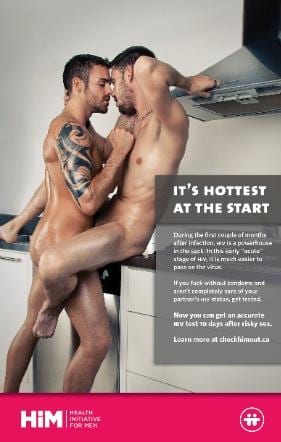A local gay men’s health organization rolled out a series of racy new ads last week, geared to getting gay men to increase how often they get tested for HIV.
The Health Initiative for Men’s (HIM) Hottest at the Start campaign was created partly in response to the findings of last year’s ManCount study, which showed that 1 in 40 gay Vancouver men are unaware they’re HIV-positive.
The campaign compares the “hotness” of a new relationship to the fact that HIV is “hottest” or most infectious when it is newly contracted. It is also designed to promote awareness of the early HIV test, which can accurately detect infection 10 days after transmission.
“It’s about letting guys know that HIV doesn’t stay the same and that it has periods where you’re more contagious than others, and the period shortly after becoming infected is one of those times,” says HIM program manager Jody Jollimore.
“We’d like to get guys who are having high-risk sex to test more regularly,” he continues. “Because guys are waiting a year or maybe longer to get tested. If they do pick up HIV along the way, and they’re still testing as per their regular routine, they may not know that for as long as a year later.”
“We think that many new infections in the gay community in BC each year are related to acute HIV,” says University of British Columbia researcher Dr Mark Gilbert.
Gilbert believes that encouraging men to get tested after risky sex to know their HIV status is an important part of preventing new infections.
Already the ads have garnered favourable responses on Facebook and Twitter for their eye-catching depictions of men hooking up in elevators, locker rooms and kitchens.
Jollimore says most of the feedback he’s heard so far has been positive about the images and aesthetics of the ads. Now he hopes the message will be just as well received by local gay men.
“Is it something they already knew? Or is it something that will help them adjust their testing practices for the future?” he asks.
“That’s really the goal: we want to effect positive change by giving gay men choices,” he says. “Some gay men use condoms; others do not, and we know that already. What we’re trying to do is give men choices and say, ‘If you’re not going to use condoms, here are other ways to reduce your risk of getting HIV.'”
Jollimore says he hasn’t directly heard any complaints about the sexually charged ads but says it’s still early. “I’ve yet to put out a campaign where there weren’t a few people upset by the graphic images,” he notes.
He doesn’t consider the ads to be graphic so much as attention-grabbing — and that’s part and parcel of getting an important message across to gay men, he says.
“There’s actually quite a bit of research that shows that using sexually explicit images is the most effective way for communicating with gay men in terms of HIV prevention,” he says.
While some companies originally objected to publishing the ads because of their racy content, Jollimore says they rescinded their rejections after some frank conversations. “They had a bit of a change of mind when they understood the importance of this campaign.”
The new campaign is jointly funded by HIM and the Acute HIV Study. Jollimore says the market value of mounting the campaign is around $100,000, but that because HIM is a not-for-profit, the actual cost is closer to $50,000. The ads will be displayed around the city, everywhere from print publications and bus shelters to condom dispensers and banner ads on gay cruising websites. HIM has also created a 30-second video to complement the campaign, to be shown on OUTtv and at this year’s Out on Screen queer film festival.

 Why you can trust Xtra
Why you can trust Xtra


